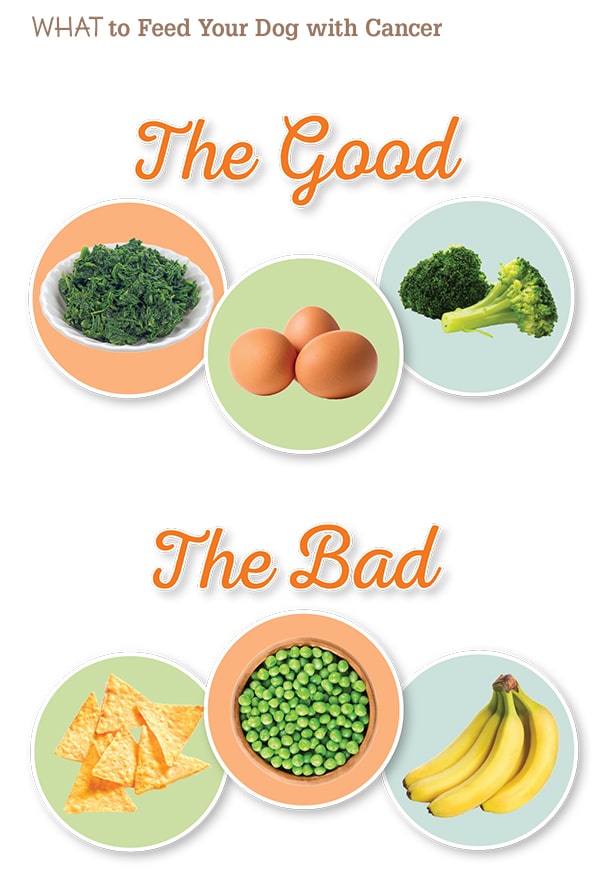The post What to Feed a Dog With Cancer by Arden Moore appeared first on Dogster. Copying over entire articles infringes on copyright laws. You may not be aware of it, but all of these articles were assigned, contracted and paid for, so they aren’t considered public domain. However, we appreciate that you like the article and would love it if you continued sharing just the first paragraph of an article, then linking out to the rest of the piece on Dogster.com.
Many people are becoming carb conscious in an effort to lose weight and feel healthier. But before you toss that pizza crust or a few french fries to your begging dog, reconsider. People and dogs aren’t the only ones who crave carbohydrates. It turns out so do cancer cells. “Cancer loves carbs and thrives on them,” says Jean Hofve, DVM, holistic veterinarian, best-selling author and founder of the Little Big Cat website. “While early research was only on lymphoma, it can now be said that all cancers are fed by carbs. By severely limiting carbs, the dog’s system will learn to function with ketones — even the brain.” Wondering what to feed a dog with cancer then? Let’s take a look.
Can food really fight cancer in dogs?

Can you really combat canine cancer through food? Photography ©miki-tiger | Getty Images.
Before we look at what to feed a dog with cancer — does what a dog with cancer eats really affect the disease? We are what we eat. And that also applies to our dogs. But are there verifiable cancer-combating foods for dogs? For now, the answer has to be maybe.
“There are no proven general strategies to nutritionally improve outcomes in dogs with cancer,” says Sean Delaney, DVM, DACVN, a board-certified veterinary nutritionist who operates the site Balance It, which offers food-grade products, menus and food-cooking videos. “However, supporting known nutritional needs should be beneficial. Not consuming enough calories to maintain an ideal body condition would be a concern in a dog with cancer. With that said, the most effective and proven treatment for dogs with cancer is drug therapy and not nutritional or dietary therapy.”
Still, making healthy choices about what foods and what supplements to give your dog dealing with cancer can’t hurt. It can only help.
“With cancer, the biggest issue is loss of muscle mass,” says Ernie Ward, DVM, America’s Pet Advocate and founder of the Association for Pet Obesity Prevention. “You are trying to feed to save or preserve muscle mass. “Lymphoma loves carbohydrates, so you should work with your veterinarian to try to reduce the carbohydrates in your dog’s diet and boost his diet with more fats and proteins.”
So, what to feed a dog with cancer? Let’s take a look.

Photos ©Getty Images.
“I’m a fan of feeding human foods that are enjoyed and not toxic to the dog with cancer,” Dr. Delaney says. “One can look for food that has an organic seal per the USDA National Organic Program. One might select a lean piece of meat or poultry to increase dietary protein or arginine intake.” Dr. Hofve singles out these healthy choices: dark meat chicken; salmon; eggs; green, leafy vegetables like spinach, as well as broccoli, cucumber and cauliflower. She adds that the vegetables should be cooked to be easily digested, and the proteins should be fresh and non-farmed.
What not to feed a dog with cancer
Foods to avoid include carbohydrate-loaded ones, such as high-carb kibbles (there are low-carb kibbles on the market), as well as any people treats high in carbs, such as potato chips, french fries, bread and corn chips. Corn, peas and bananas should be skipped. Also avoid giving your dog any processed proteins, such as hot dogs, ham or pig’s ears.
What supplements are best for dogs with cancer?
When asking what to feed a dog with cancer, you might want to consider giving your dog some supplements, too. Dogster asked our experts to recommend supplements or vitamins to give to dogs dealing with cancer.
Topping their lists:
- Omega-3 fatty acids (EPA and DHA): Possessing anti-inflammatory properties, omega- 3s are vital to the health of cell membranes.
- Dr. Hofve recommends fish oil products from non-farmed fisheries, cod liver oil and green-lipped mussels. Adds Dr. Delaney: “Consider marine fish oil, but the dose must be carefully customized to the dietary intake of n-6 fatty acids in the diet.”
- Adaptogens: Astragalus and Rehmannia offer many beneficial pluses for the whole body and help to reduce stress. Adds Dr. Hofve: “They can broadly improve immune function and for dogs on chemotherapy, they may increase white blood cell counts.”
- Medicinal mushrooms: They are touted to have anti-cancer effects by enhancing the immune system. Reishi mushrooms are potent and popular choices. Adds Dr. Ward: “I recommend mushroom extracts. There are no real studies to support, but in most of my canine cancer patients, it is a known immune stimulant to improve the body to fight off or slow down cancers.”
- Balance It Carnivore Blend: This supplement adds essential minerals and vitamins.
Sample recipe for a dog cancer diet
Dr. Jean Hofve knows firsthand the jarring impact of discovering your dog has cancer.
When her Australian Shepherd mix, Willy, was 12 years old, he developed a malignant hemangiopericytoma on his elbow that was surgically removed. It was a very aggressive tumor, but Dr. Hofve fed Willy a homemade diet and gave him a homeopathy treatment called Ojibwa Tea (Essiac), and Willy lived cancer-free for another two years. “Willy was special — that’s for sure,” she says. “Even my dog-averse mother adored him.” Dr. Hofve shares this basic recipe for your dog dealing with cancer. Before feeding, discuss with your veterinarian how to customize this recipe for your dog’s specific needs.
- 75 percent cooked fatty meat, such as dark poultry, non-farmed salmon or ground lamb (eggs can also be used as a protein source)
- 25 percent non-starchy vegetables that are cooked or pureed to make them easy for your dog to enjoy and thoroughly digest. Top picks: broccoli, cauliflower, cucumbers, mushrooms and green leafy vegetables.
- Add extra fat in the form of olive oil, flaxseed oil, hempseed oil or avocado oil
- Provide a vitamin-mineral supplement approved for dogs
- Add a calcium supplement and antioxidant blend supplement
To learn more about what to feed a dog with cancer:
Find out more info on canine nutrition and cancers at these websites. And always work in conjunction with your veterinarian.
- BalanceIt.com – balanceit.com
- Little Big Cat – littlebigcat.com
- Dr. Ernie Ward – America’s Pet Advocate – drernieward.com
- Dr. Harvey’s Paradigm – drharveys.com
- Keto Pet Sanctuary – ketopetsanctuary.com
- Canine Cancer – caninecancer.com
What else can you do if your dog is diagnosed with cancer?
If your dog is diagnosed with a form of cancer, it is definitely time to boost your relationship with your veterinarian, who can recommend veterinarians board-certified in holistic medicine, nutrition and oncology. And carefully critique all food and treat labels.
“Dogs with cancer already have a compromised immune system — even more so if they are on chemotherapy, so I don’t recommend raw meat for them,” Dr. Hofve adds. “Supplements and oils should be generally added after cooking due to heat’s ability to harm them.”
Thumbnail: Photography ©elenaleonova | Getty Images.
About the author
Arden Moore, the Pet Health and Safety Coach, is a pet behavior consultant, master certified pet first-aid instructor, author and host of the Oh, Behave Show on Pet Life Radio. Learn more at ardenmoore.com.
Editor’s note: This article appeared in Dogster magazine. Have you seen the new Dogster print magazine in stores? Or in the waiting room of your vet’s office? Subscribe now to get Dogster magazine delivered straight to you!
Read more about canine cancer on Dogster.com:
The post What to Feed a Dog With Cancer by Arden Moore appeared first on Dogster. Copying over entire articles infringes on copyright laws. You may not be aware of it, but all of these articles were assigned, contracted and paid for, so they aren’t considered public domain. However, we appreciate that you like the article and would love it if you continued sharing just the first paragraph of an article, then linking out to the rest of the piece on Dogster.com.
No comments:
Post a Comment